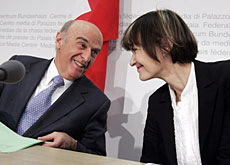
Swiss rule out negotiations with EU in tax row

The Swiss government has rejected formal negotiations with the European Union in a bid to resolve a controversy over the country's corporate tax system.
However, the cabinet said Switzerland – which is not a member of the EU – was willing to have a dialogue with Brussels on fiscal policy, but gave no date for talks.
Finance Minister Hans-Rudolf Merz and Foreign Minister Micheline Calmy-Rey said on Wednesday that Switzerland would not surrender its sovereignty on tax matters.
The statement came in the wake of a decision earlier this week by EU ministers to open official negotiations with Switzerland.
Brussels wants the Swiss authorities to scrap the practice of exempting tax on company profits generated in EU countries. It claims the current rule violates a 1972 free trade accord.
Switzerland has repeatedly denied the allegation. Over the past few weeks several ministers have come out against holding formal negotiations with Brussels in the tax row.
Merz said the cabinet and the cantons, which have wide-ranging autonomy in fiscal matters, wanted to ensure that Switzerland remains competitive.
Serious impact
He added that the details of EU demands for amendments to the tax laws were not clear, but he warned that a total of 20,000 Swiss and foreign holding companies with a tax revenue of SFr7 billion ($5.8 billion) could be affected by changes.
“We would have a serious problem without this revenue,” Merz said.
Switzerland wanted to remain outside the EU tax system, but was keen to continue its policy of bilateral treaties with Brussels, according to the finance minister.
He said his ministry was preparing to hold talks with EU experts at some point in the near future but ruled out formal negotiations on the basis of the free trade agreement.
Last month, Merz suggested an overhaul of the corporate fiscal system, including tax breaks for both Swiss and EU companies.
Respect
For her part Calmy-Rey said Switzerland was committed to its obligations with the EU and called for Brussels to do likewise.
“We will see whether the clear position of Switzerland is respected,” Calmy-Rey, who is also Swiss president this year, said.
She added that Switzerland never refused to talk with Brussels. “It’s up to the EU to ensure that we achieve a result which satisfies both sides,” she pointed out.
Calmy-Rey said the differences of opinion over the tax issue should not jeopardise the relations between Switzerland and the EU.
Reaction
The EU ambassador to Bern, Michael Reiterer, said he welcomed Switzerland’s offer to come to the table. He said that in an initial stage it was not crucial to specify whether there will be formal negotiations or talks.
The anti-EU group, Campaign for an Independent and Neutral Switzerland, as well as the rightwing Swiss People’s Party criticised the government for softening its stance.
They said the offer to have talks was tantamount to giving in to pressure.
Ahead of Wednesday’s cabinet meeting, three of Switzerland’s four main political parties ruled out negotiations. Only the centre-left Social Democrats came out in favour of some form of talks with Brussels.
swissinfo with agencies
Swiss position:
Switzerland believes that the 1972 free trade accord with the European Union does not apply to the tax benefits granted to foreign companies by a number of cantons.
It argues that the 1972 agreement is only applicable to certain goods (agricultural and industrial products).
Bern also says that when the agreement was signed, Switzerland and the European Community did not foresee harmonising their legislation. Bern also argues that the rules of the trade agreement must not be interpreted in the same way as internal EU regulations on competition.
EU position:
The European Commission says that tax privileges granted by some Swiss cantons to foreign companies are contrary to the 1972 accord.
The EU is calling on Switzerland to give up the tax practice and adapt to its demands.
The tax advantages in question concern foreign holding companies whose headquarters are in Switzerland but which make profits abroad.

In compliance with the JTI standards
More: SWI swissinfo.ch certified by the Journalism Trust Initiative

























You can find an overview of ongoing debates with our journalists here . Please join us!
If you want to start a conversation about a topic raised in this article or want to report factual errors, email us at english@swissinfo.ch.